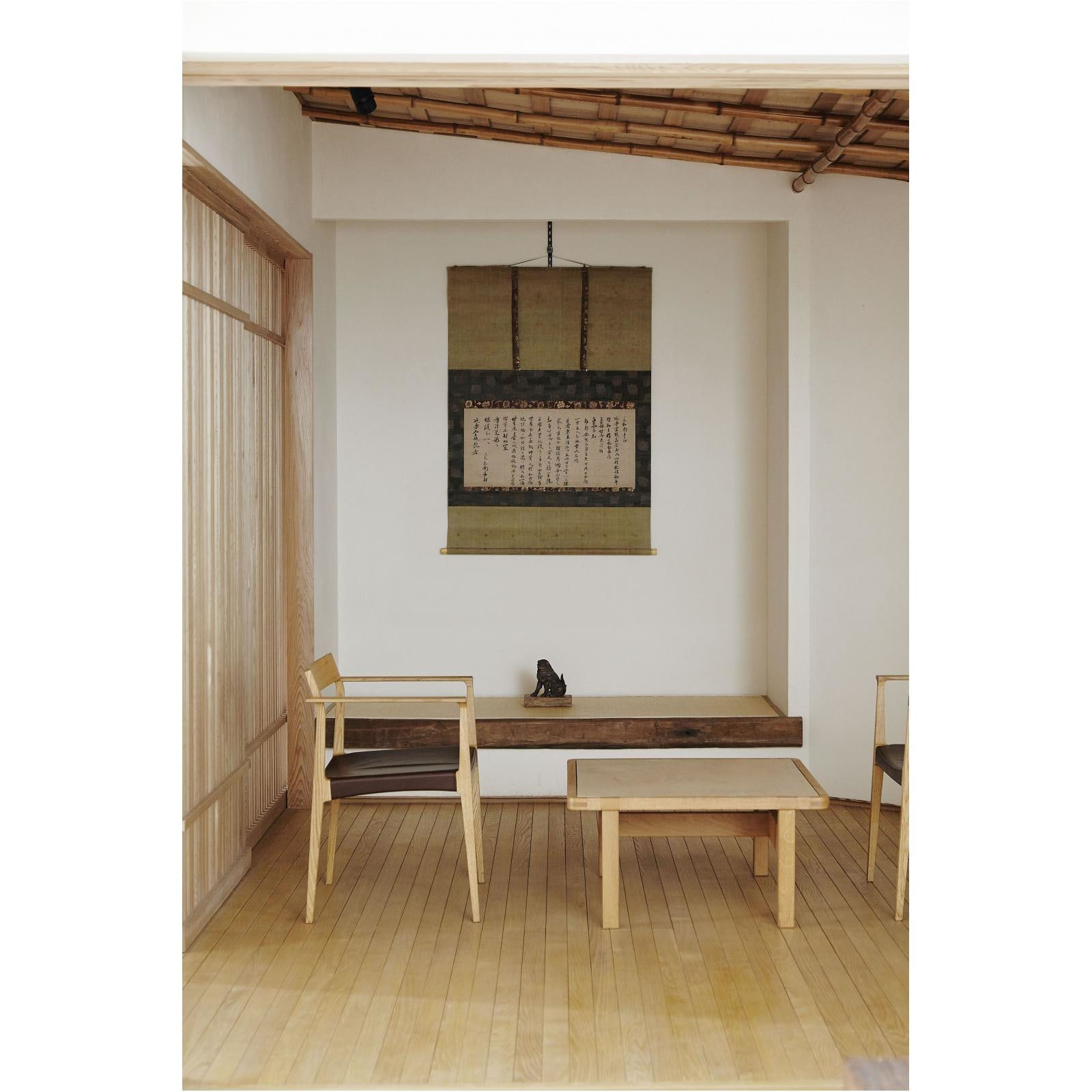Wuzhun Shifan (1178–1249)
Letter to the Head of Yanshou-tang
Ink on paper, hanging scroll
Double boxed
Important Cultural Property
31 x 68 cm
114 x 80 cm (overall)
Double boxed
Important Cultural Property
31 x 68 cm
114 x 80 cm (overall)
Further images
Provenance
Collection of Ryoko-in of Daitoku-ji templeCollection of Naba Kurozaemon
Literature
Tayama Honan, ed. Shoku zenrin bokuseki jo. Kamakura: Zenrin Bokuseki Kanko kai, 1965.
Wuzhun Shifan was a celebrated Chinese Linji Chan (J. Rinzai Zen) master of the Southern Song dynasty, who is also remembered by the title “Fojian Chanshi” (Buddha Mirror Chan Master), which was conferred upon him by Emperor Lizong (r. 1224-1264). Wuzhun greatly influenced Chan (Zen), not only in China but also in Japan, and had many prominent Chinese and Japanese disciples including: Xueyan Zuxin; Wuxue Zuyan, the founder of the Kamakura temple Enkaku-ji; Wuan Puning, the second abbot of the Kamakura temple Kencho-ji; Enni Ben’en, who studied in China and founded the Kyoto temple Tofuku-ji; and Sosai Hoshin, the founder of the Matsushima temple Enpuku-ji (Zuigan-ji). Accordingly, Wuzhun’s calligraphy has been highly prized. Like many of his works, this hanging scroll also demonstrates an austere and steady brushwork.
The letter here is addressed simply to the “head of Yanshou-tang temple.” Its contents reveal that it was sent as a reply together with a set of Buddhist robes to one of Wuzhun’s Dharma heirs after a long absence in correspondence. The missive can be understood as the master sending his blessings to his disciple on the latter’s appointment as abbot. Wuzhun praises him for his outstanding qualities, and mentions the gift of a twill-weave vestment, which may have been given as a denpo-e, or transmission robe. Conveyed in this letter are Wuzhun’s anticipation of his disciple’ s future prospects as well as his heartfelt care for the next generation.
Although it is difficult to confirm the identity of the “head of Yanshou-tang temple,” the scholar Tayama Honan (1903–1980) discovered that Yanshou-tang was located in Tanzhou (now Hunan Province), and that Wuzhun’s prominent disciple Xueyan Zuxin resided in Tanzhou at the Longxing-si temple. Based on this, Tayama suggests that the receiver of the letter is Xueyan, who would have been a disciple worthy of receiving such vestments from his teacher.
The inscription on the box for this hanging scroll indicates that the work belonged to Ryoko-in, a subtemple of Daitoku-ji monastery in Kyoto, and was presented to the wealthy merchant Naba Kurozaemon (also known as Layman Dainen Joyu, d. 1664) in appreciation for his contribution in rebuilding a temple hall at Daitoku-ji. It is designated today as an Important Cultural Property of Japan, and the name of its donor “Joyu” can be found on its roof tiles.
Wuzhun Shifan (Chan priest; 1178−1249)
Also known as Bushun Shiban; Yong (family name); Fojian Chanshi (posthumous).
Southern Song Linji-zong (Rinzai-shu) Chan priest. Born in Zitong county, Jianzhou. Became a disciple of Daoqin, and followed the complete commandment. Also studied under Raoshouzuo, Fozhao Deguang, Poan Zuxian, and Husunzi. His disciples include Xueyan zuqin, Wuxue zuyuan, and En’ni Ben’en. Was designated the posthumous “Fojian Chanshi” by Emperor Lizong of Song.
The letter here is addressed simply to the “head of Yanshou-tang temple.” Its contents reveal that it was sent as a reply together with a set of Buddhist robes to one of Wuzhun’s Dharma heirs after a long absence in correspondence. The missive can be understood as the master sending his blessings to his disciple on the latter’s appointment as abbot. Wuzhun praises him for his outstanding qualities, and mentions the gift of a twill-weave vestment, which may have been given as a denpo-e, or transmission robe. Conveyed in this letter are Wuzhun’s anticipation of his disciple’ s future prospects as well as his heartfelt care for the next generation.
Although it is difficult to confirm the identity of the “head of Yanshou-tang temple,” the scholar Tayama Honan (1903–1980) discovered that Yanshou-tang was located in Tanzhou (now Hunan Province), and that Wuzhun’s prominent disciple Xueyan Zuxin resided in Tanzhou at the Longxing-si temple. Based on this, Tayama suggests that the receiver of the letter is Xueyan, who would have been a disciple worthy of receiving such vestments from his teacher.
The inscription on the box for this hanging scroll indicates that the work belonged to Ryoko-in, a subtemple of Daitoku-ji monastery in Kyoto, and was presented to the wealthy merchant Naba Kurozaemon (also known as Layman Dainen Joyu, d. 1664) in appreciation for his contribution in rebuilding a temple hall at Daitoku-ji. It is designated today as an Important Cultural Property of Japan, and the name of its donor “Joyu” can be found on its roof tiles.
Wuzhun Shifan (Chan priest; 1178−1249)
Also known as Bushun Shiban; Yong (family name); Fojian Chanshi (posthumous).
Southern Song Linji-zong (Rinzai-shu) Chan priest. Born in Zitong county, Jianzhou. Became a disciple of Daoqin, and followed the complete commandment. Also studied under Raoshouzuo, Fozhao Deguang, Poan Zuxian, and Husunzi. His disciples include Xueyan zuqin, Wuxue zuyuan, and En’ni Ben’en. Was designated the posthumous “Fojian Chanshi” by Emperor Lizong of Song.







